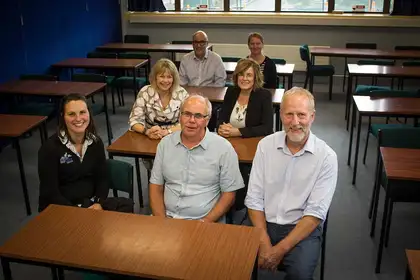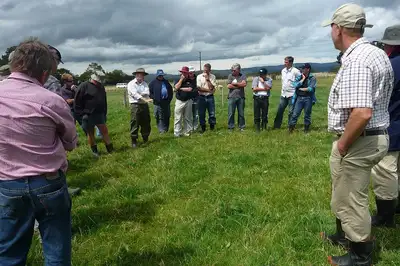
Some of the study’s contributors (front) Dr Lydia Cranston, Mr Doug Drysdale and Professor Hugh Blair. (Middle) Associate Professor Alison Sewell and Dr Maggie Hartnett. (Back) Professor Peter Kemp and Dr Rene Corner-Thomas.
An award-winning study from Massey University has found that getting farmers to understand and adopt the newest ideas and innovations from agricultural science, relies not only on the strength of the research, but also on the way farmers learn, and their learning environment.
Agricultural extension involves educating farmers about how scientific research can be used to improve agricultural practices on farm. It typically involves knowledge-holders like consultants, academics and scientists, speaking at field days, seminars, or communicating through print or online newsletters. This model requires complex science to be transferred over short-periods of time and is often one-way, which can have mixed results in actual uptake from farmers.
The innovative agricultural extension programme involved farmers aged between 35 and 70, who classified themselves as either existing users of herb pastures, new users, possible new users or non-users, for an initial 18-month trial and a three-year second phase, of a herb-mix pasture establishment and management trial.
The ultimate proof of the programme’s success was the changes farmers made to their farming systems using herb pastures, with all of the farmers making changes.
Head of the School of Agriculture and Environment, Professor Peter Kemp says new ideas coming from universities aren’t always understood by farmers and changes are slow to occur on farm.
“From the production side of things, we had some theories of lamb finishing on herb-mix pastures and we were ready to start getting farmers involved in the trial, but we knew the difficulties in transferring this knowledge and successful adoption by farmers is relatively difficult due to the complex grazing management required in comparison to traditional pastures.
So we thought, why not engage with people from Massey who know about education to see how can we best explain that to farmers and help them think it through themselves and get them to the point where they might adopt it.”
So the programme enlisted the expertise within Massey’s Institute of Education to design learning experiences that the agricultural scientists could use to share their research. Those experts stayed on during the trials, improving the learning programme as it progressed by interviewing farmers one-on-one and in groups to see what learning methods were working and feeding those back into the programme to improve its effectiveness.
Lead author Associate Professor Alison Sewell of the Institute of Education says from the outset it was clear the methods of traditional extension were based on outdated education theories.
“Our new learning experiences were based on contemporary theories in education like sociocultural approach and theory. For example, we worked to build learning communities between farmers and scientists, rather than short, one-way exchanges. While these communities have been proven effective for some learners, we didn’t know what factors might support or hinder farmers when they too were introduced to these more collaborative ways of learning.”
They proved to be one of the programme’s greatest successes. Rather than ad hoc farmer engagement in learning, or the use of off-the-shelf extension programmes, the promotion of farmers’ learning was embedded within a sustained learning community.”

Group discussions were among the key findings for the study.
New ideas
Dr Sewell says the scientist-farmer learning community led not only to the development of respectful relationships, but the co-construction of new ideas about pasture management.
“Scientists brought research and theoretical ideas, and the farmers brought practical knowledge. These communities promoted dialogue which not only supported learning but helped build farmer’s beliefs that they were capable of using new technologies.”
Institute of Education’s Dr Maggie Hartnett says that while they expected learning communities to be successful, some findings were unexpected, and became novel ideas for use in agricultural extension.
We found a strong need for self-efficacy in the farmers, which is people believing they have the knowledge skills and abilities that they need to be successful at something. It's a bit like self-confidence but it is much more specific to a particular domain of knowledge than self-confidence. It’s the belief you can do something or can’t do something based on either your own experience or something you’ve seen others do.
“The farmers used different sources of information to make judgments of their self-efficacy, including their own personal success, as well as seeing other farmers succeed.
For example, they may have seen their neighbour succeed growing chicory or plantain, so they are more likely to say I can do this too. This can also work in the opposite direction for failure, but this wasn’t as strong with them. We put this down to the farmer attitude and because they’re all pretty capable farmers already.”
Identified barriers to learning and practice change included issues of: trialability, complexity, compatibility and risk.
The article was named the best article in The Journal of Agricultural Education and Extension, for their work examining how farmer learning is supported and hindered through an innovative agricultural extension programme. Along with Dr Sewell and Dr Hartnett, the study involved School of Agriculture’s Dr David Gray, Professor Hugh Blair, Professor Peter Kemp, Professor Paul Kenyon, Professor Steve Morris and Associate Professor Brennon Wood.
The winning article, Using educational theory and research to refine agricultural extension affordances and barriers for farmers’ learning and practice changes, is free to access until December, 2018.